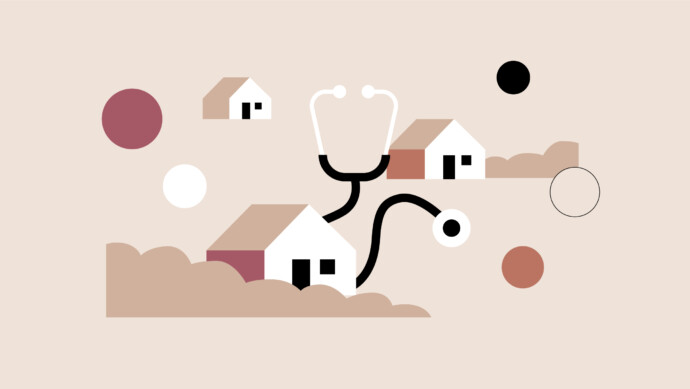
While urban medical centers dominate headlines with cutting-edge procedures and specialized treatments, rural physicians provide essential care to more than 60 million Americans.
These practitioners face unique challenges that their urban counterparts rarely encounter, and are often working with limited resources. That’s concerning, since the rate of death from natural causes like chronic diseases is 43 percent higher in working-aged rural Americans compared to city dwellers, according to a 2024 report from the U.S. Department of Agriculture (USDA). While the challenges of practicing rural medicine can’t be solved by physicians alone, you can adopt strategies that can help you provide quality healthcare in your corner of the nation.
Understanding the landscape of rural medicine
The U.S. Office of Management and Budget (OMB) defines “rural areas” as those with populations under 50,000, though the definition varies by organization, according to the American Medical Association (AMA). The U.S. Health Resources and Services Administration (HRSA) identifies more than 8,000 primary care Health Professional Shortage Areas (HPSAs) across the country, with rural communities representing the majority of these underserved regions.
These communities face distinct health challenges that set them apart from urban areas. Rural populations experience 21% higher rates of heart disease mortality, 15% higher cancer death rates and significantly elevated rates of diabetes, hypertension and suicide. Geographic barriers compound these issues, as patients may have to travel hours for specialized care or emergency services.
Various types of practices exist in rural settings. Solo family practices remain common, though many physicians now work within Federally Qualified Health Centers, critical access hospitals or telemedicine-enabled clinics. Community health centers provide comprehensive primary care, behavioral health services and specialized programs tailored to local needs. Rural physicians often function as true generalists, managing conditions that urban specialists would typically handle.
The technology landscape in rural medicine continues evolving rapidly. While some areas still don’t have widespread basic broadband connectivity, others have embraced telemedicine, electronic health records (EHR) and remote monitoring systems that connect patients with urban specialists.
Online communities like Sermo are also reducing the isolation that historically characterized rural practice. In a recent internal Sermo poll of U.S. physicians, 22% of members said they’re currently practicing in a rural area and 37% said they previously did during a residency, fellowship, or short-term rotation.

The biggest barriers to recruiting physicians to rural areas
Significant barriers sway physicians away from choosing rural practice. These obstacles include:
Geographic isolation or lifestyle mismatch
Rural living isn’t suitable for everyone. Some physicians prefer the anonymity and cultural diversity of urban environments. “That is a whole issue, everyone wants to stay and work in the big cities, partly because they like the pace of city life and it is more comfortable to live in the same city,” writes a general practitioner on Sermo.
Research finds that physicians are more likely to choose rural practice if they grew up in a rural area. Geographic isolation and lifestyle mismatch stood out as the biggest barrier to recruiting physicians in rural areas in an internal Sermo poll, with 71% of votes (note: respondents could pick more than one response). Rural communities typically offer fewer educational and cultural resources compared to urban areas, as underscored by 41% of participants in the poll.
The geographic isolation forces on-the-job education, a dermatologist on Sermo believes, saying, “When I started working, I worked in a rural area, I went through a lot of work and had no one to consult or ask for a more advanced and updated opinion, so I had to grow myself and I am infinitely grateful for having worked alone to have learned what that today I know as a doctor”.
Limited career opportunities for spouses/partners
In the Sermo poll, the second most popular factor deterring physicians from rural practice was limited career opportunities for partners, receiving 52% of votes. When physicians have spouses or partners with their own careers, rural locations may not offer suitable employment opportunities. This forces many physicians to choose between their preferred practice setting and their family’s financial wellbeing.
Lack of professional support or resources
Professional isolation ranks among the most challenging aspects of rural medicine, accounting for 51% of votes in the poll. Unlike urban physicians who can easily consult colleagues down the hall, rural practitioners often have limited peer support. Rural hospitals often lack advanced diagnostic equipment and specialized departments that urban physicians may take for granted.
This isolation becomes particularly acute during complex cases requiring specialized expertise. “When I was a cardiology fellow, my husband wound up in a very rural area, for a weekend, as the only doctor was not available,” recounts a family medicine physician on Sermo. “He felt comfortable practicing internal medicine and cardiology. A woman brought in who was in labor turned out to be a very difficult delivery with the cord around the baby, an episiotomy, etc. The nearest OB was one hundred miles away…and nothing to do but deliver.”
Lower pay or financial incentives
The least popular answer in the survey corresponded to lower pay or financial incentives, with 34% of votes. For many physicians, it’s not a concern, since rural positions tend to offer competitive salaries to attract talent.
However, financial challenges can extend beyond salary considerations. Rural practices may offer fewer opportunities for supplemental income through procedures, research participation or consulting work that urban physicians can routinely access.
Benefits of rural medicine
The decision to practice in a small town can also offer rewards. These are some of the main benefits of rural medicine for doctors:
Broad scope of practice
Rural medicine can allow you to practice the full breadth of your training in ways rarely possible in urban settings. Family physicians might perform cesarean sections, manage intensive care patients, provide emergency trauma care and conduct minor surgical procedures—all within their scope of practice.
This variety keeps rural physicians intellectually engaged and professionally challenged. Rather than seeing repetitive cases within a narrow specialty focus, rural practitioners encounter diverse medical conditions requiring broad knowledge and adaptability.
Strong patient-doctor relationships
Rural medicine fosters deep, long-term relationships between physicians and patients that extend across generations. Rural physicians often care for entire families, from delivering babies to providing end-of-life care for grandparents.
The continuity of care can allow you to see the long-term impact of your interventions. Rather than providing episodic care, you might witness patients’ health journeys over decades, creating a deeper sense of purpose.
Meaningful community impact
Rural physicians often serve as community leaders whose influence extends far beyond medical care. They may sit on school boards, participate in economic development initiatives or advocate for public health policies. This community leadership role amplifies their impact and creates additional professional fulfillment.
The physician shortage in rural areas means each practitioner’s presence significantly impacts community health outcomes. Rural physicians often also play crucial roles in health education and disease prevention within their communities.

Practical strategies for a successful rural medicine career
If you’re considering rural practice, you can take several steps to prepare. Mentorship represents one of the most valuable resources for aspiring rural physicians. Experienced rural practitioners can provide insights that you won’t receive through textbooks. Many state medical associations offer rural mentorship programs that pair experienced rural physicians with residents or new graduates interested in rural practice.
It’s especially important to invest time in learning telehealth platforms, as noted by a psychiatrist on Sermo. “I practice Telehealth Psychiatry for clinics in Mississippi,” they write. “There are no local psychiatrists, if Telehealth stops, care stops for most of these people with limited transportation and finances.”
Part of your focus should also go toward financial planning. You can look into loan repayment programs, including the National Health Service Corps (NHSC) and state loan forgiveness programs, and rural hospital loan repayment programs. They can eliminate significant educational debt while providing guaranteed income during your early career years.
When it comes time to compare job offers, consider the total compensation package beyond base salary. Many rural positions offer comprehensive benefits, housing allowances, continuing education stipends and malpractice coverage that enhance the overall value proposition.
Keep in mind that professional development in rural settings requires proactive planning. Many medical societies offer rural-specific educational programs (for example, the National Rural Health Association’s Rural Medical Education Conference) designed to address the unique challenges and learning needs of rural practitioners.
Building the future of rural medicine
Rural medicine physicians face significant obstacles, but they also experience unique rewards. Common barriers to rural practice persist, from lifestyle mismatch to spouse employment challenges. However, solutions like expanded telemedicine, improved loan forgiveness programs, and enhanced training opportunities show promise for strengthening the rural healthcare workforce.
If you’re considering rural medicine, you can still stay in touch with physicians in other areas. Sermo’s community includes more than 1.5 million healthcare professionals worldwide, where rural physicians connect and support each other daily. You can share a challenging case, seek specialist input or simply connect with colleagues who understand the quirks of rural practice.
Rural medicine offers the opportunity to provide essential care where it’s needed most. Small town-based Sermo members have shared that the challenges are real, but so are the rewards.















